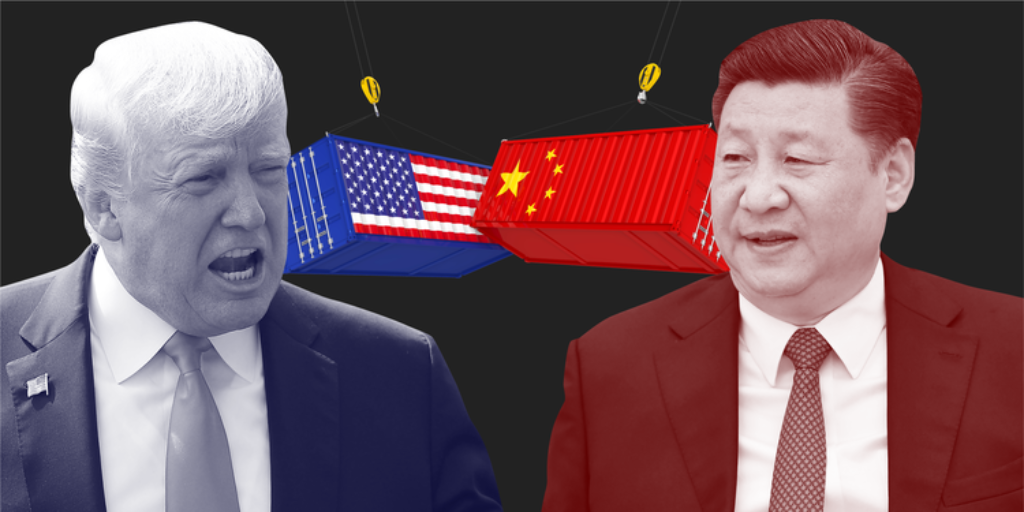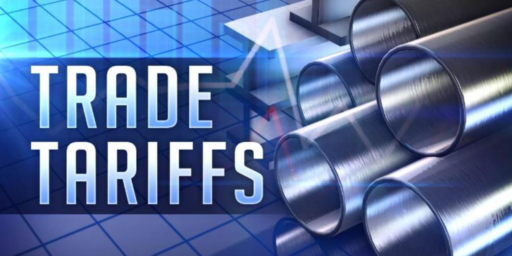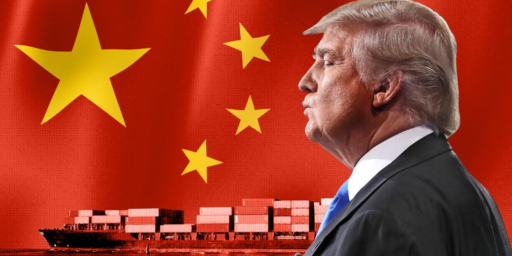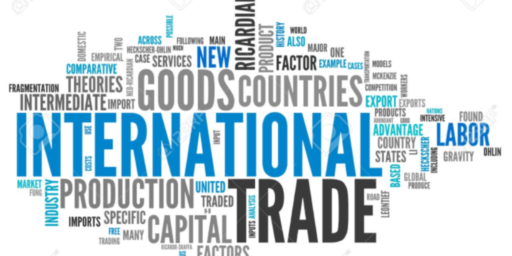Trump And Xi Agree To Resume Trade Talks
President Trump and Chinese President Xi Jinping have agreed to resume trade talks, but Trump's ill-advised trade war will continue.

President Trump and Chinese President Xi Jinping have agreed to get trade talks back on track, but it’s unclear if this will lead to an end to the ongoing U.S.-Chinese trade war:
OSAKA, Japan — President Trump and President Xi Jinping of China agreed on Saturday to resume trade talks after a seven-week breakdown, averting for now an escalation of their multibillion-dollar tariff war that has roiled global markets and threatened the future of the world’s two largest economies.
The agreement, brokered during more than an hour of discussion between the leaders, did not by itself signal any major breakthrough in resolving the fundamental conflict. But it represented a temporary cease-fire to give negotiators another chance to forge a permanent accord governing the vast flow of goods and services between the two nations.
“We discussed a lot of things, and we’re right back on track,” Mr. Trump told reporters after his session with Mr. Xi on the sidelines of the annual summit meeting of the Group of 20 nations in Osaka, Japan. “We had a very, very good meeting with China,” the president added, “I would say probably even better than expected, and the negotiations are continuing.”
Mr. Trump promised to hold off on his threat to slap new 25 percent tariffs on $300 billion in Chinese imports, and he agreed to lift some restrictions on Huawei, the Chinese technology giant at the center of a dispute between the nations.
In exchange, he said, China agreed to buy a “tremendous amount” of American food and agricultural products. “We will give them a list of things we want them to buy,” he said.
(…)
[T]he talks with China, with so much at stake for both sides, were the centerpiece of the trip.
The latest pause in the trade war seemed to be a repeat of sorts of what happened at the last G20 summit meeting, in December in Buenos Aires.
There, Mr. Trump and Mr. Xi also met and agreed to postpone further tariffs pending negotiations and more soybean purchases by Beijing. The question is whether the new opening will yield any better result.
The “two sides are highly harmonious, and the areas of cooperation are broad,” Mr. Xi said, according to The People’s Daily, an official Chinese news outlet. “They should not fall into the trap of so-called conflict confrontation, but should promote each other and develop together.”
The biggest question over Saturday’s deal involved what exactly Mr. Trump had agreed to do for Huawei, which the United States has called a security threat. Mr. Trump said that he would allow more sales of American components to the telecom giant, and that the Commerce Department would soon review its legal measures restricting these exports.
But Mr. Trump did not say what would happen to pending Justice Department actions against the company and one of its executives, both of whom have denied wrongdoing.
Trade talks collapsed in May when China’s leadership became uncomfortable with many provisions in the draft text of a deal. Particularly contentious were draft provisions calling for China’s legislature to enact many amendments to Chinese laws.
The United States had insisted on the amendments as a way to make it more likely that Chinese government agencies would abide by promises made by Chinese negotiators. But a nationalistic backlash within the Chinese government prompted Chinese negotiators to send a new version of the draft agreement to American negotiators that deleted extensive passages.
Trade talks then broke down a week later, and Mr. Trump responded by raising tariffs on $200 billion a year in Chinese imports. He also threatened to slap 25 percent tariffs on another $300 billion a year worth of American imports from China. Beijing retaliated with its own tariffs.
Scott Kennedy, a China specialist at the Center for Strategic and International Studies in Washington, said resuming trade talks and pausing further American tariffs still left the two sides with broad differences. In parallel with raising tariffs over the past year, the Trump administration has also imposed ever tighter limits on the sale of American high-tech products to China and on Chinese investment in the United States.
“They are more likely to continue going around in circles rather than reaching the destination of a real deal,” Mr. Kennedy said. “Neither side looks ready to compromise; meanwhile, the tech war will continue to intensify. This is a truce on only one front of the wider conflict.”
In the short term at least, the resumption of trade talks should calm fears on Wall Street and elsewhere regarding the potential expansion of a trade war that began, of course, with Trump’s own brand of economic foolishness. More importantly, the talks will not result in the lowering of any of the tariffs that have been in place for more than a year now, nor will they stop the impact the trade war is having on the economy. For example, after President Trump raised tariffs on aluminum and steel last year, the price for those products, including from domestic sources unaffected by the tariffs, increased, causing problems for industries that rely on those raw materials to make their products such as the makers of automobiles and large appliances. When China retaliated by imposing tariffs on American goods their retaliation was primarily focused on the agricultural industry, something that made American pork farmers increasingly nervous about their overseas business. In Iowa, it was reported that Chinese retaliation for the tariffs cost soybean farmers $624 million this year alone, with the prospect of larger losses if the retaliation continues or if Chinese companies that buy American soybeans start entering into contracts with growers in places such as Australia and India, which compete with American farmers for the lucrative Chinese market. Additionally, we have also seen that the tariffs have had a negative impact on other American businesses, and has even led an iconic American brand like Harley-Davidson to announce that they are moving some production overseas in response to the retaliatory tariffs imposed by the European Union. Finally, there is increasing evidence that the trade war has actually opened economic doors for China because it has forced them to look in places other than the United States for things like agricultural imports. If that continues to happen, then the impact on the American economy from the President’s trade war could become more permanent than many realize.
As I’ve noted in the past, the arguments that these tariffs help either American industry or the American economy are nonsense. In the end, higher tariffs end up being paid by American consumers, by American businesses that depend on international trade such as the agriculture industry, and by the businesses that rely on the products that are subject to the tariffs. President Trump’s arguments to the contrary notwithstanding, there is no economic benefit at all to tariffs and a heck of a lot of negative. Despite that, the Trump Administration appears committed to this ill-advised, self-destructive policy.





By my count, this is at least the fourth time since May 2018 that China has promised to buy “lots more agricultural products”. I guess Trump and Xi struggle to find anything else produced in America that the Chinese would conceivably consider buying over and above their existing imports. The reality must slowly be sinking into Trump’s head that the trade imbalance with China is not going to change in the next 18 months, and he’s going to have no plausible response to claims he misled the public with his reckless ranting about how easy trade wars are to win.
And once again the master negotiator, the dude who did it for a living, the now President who negotiated his way to the top of the world once again folds like a cheap suit by giving in to China’s demands regarding letting Huawei back into the U.S’s good graces.
This is the same Huawei that the administration recently made a big deal of sounding like they were an existential threat to the security of the United States, yes?
Wow.
But I thought Huawei had sekrit backdoors so the PLA could steal our strawberries. What changed???